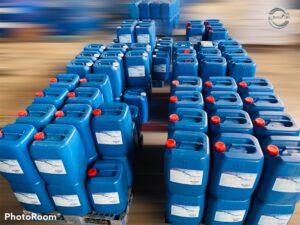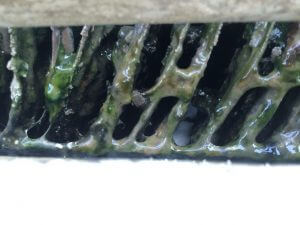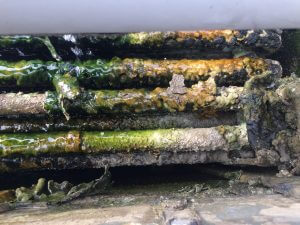Microbial algae in the cooling system cause flow obstruction, reduce cooling efficiency and cause system corrosion. Nam Viet will help customers better understand microbiology in the cooling system and how to handle it.

Chemicals used for cooling towers are provided by Nam Viet
Formation of algae and algae in the cooling tower system Cooling Tower
- The cooling system is always wet, creating favorable conditions for the growth of microorganisms such as algae, fungi, and bacteria.
- The growth of these microorganisms creates a film on the surface.
- As it grows more and more, it will become a layer of scale.
- Compared to a closed cooling system (chiller), an open cooling system (cooling tower) is a favorable environment for microorganisms to grow.
- Conditions of temperature, pH, air, and circulating nutrient content help microorganisms grow.
- Light is a necessary condition for algae to grow.

Slimy algae clinging to the radiator fins of the cooling system
Microorganisms commonly found in Cooling Tower cooling tower systems
Bacteria in the cooling tower system
- There are many different types of bacteria that live in cooling systems.
- In the cooling tower there are not only aerobic bacteria but also anaerobic bacteria.
- Legionella bacteria is an aerobic, non-spore-shaped, flagellated, gram-negative bacteria that grows under optimal temperature conditions. is 370C.
- They often reside in the water pipes of air conditioners.
- Legionella bacteria cause respiratory diseases.
- Many people are affected by Legionella bacteria when working or living in buildings that use cooling systems.
- In particular, according to the assessment of Ho Chi Minh City University of Medicine and Pharmacy Hospital</a > and Pham Ngoc Thach Hospital (Ho Chi Minh City), number of patients with asthma Asthma, respiratory diseases affected by the working environment are increasing.
- In an average week, Ho Chi Minh City University of Medicine and Pharmacy Hospital receives dozens of cases for examination
- Many cases of pneumonia with joint pain, headaches, and diarrhea are caused by the bacteria legionella pneumophila.
- Legionella bacteria in the cooling system
Fungi in the cooling tower system
- There are two basic types, including mold (small filaments), yeast (single-celled)
- Fungi also create viscous deposits in cooling systems.
Algae in the cooling tower system
- Algae are autotrophic organisms that use photosynthesis.
- Green algae and blue-green algae are quite common in cooling tower systems.
- Unbalance the flow and reduce the efficiency of the heating system.
- The above microorganisms exist in the cooling system system, creating a covering layer of microbial membrane.

Algae and scale build up on cooling pipes
Chemicals for microbiological treatment of algae in the BSG 30 cooling tower system
- BSG 30 is a non-oxidizing, low-foaming microbiicide for treating microorganisms in open cooling systems.
- BSG 30 is unaffected by soluble salts, hardness, oil contaminants and copolymers.
- BSG 30 does not contain heavy metals, only contains a mixture of easily decomposed organic substances.
- BSG 30 for environmentally friendly cooling system water treatment.
- BSG 30 kills algae and algae in cooling systems with high activity and is used as a microbial detergent.
- Low toxicity, easy to decompose.
- BSG 30 is injected into the system at any time during open cooling system operation.
- BSG 30 can be introduced into the system directly by manual method or by dosing pump.
Refer to anti-scale corrosion chemicals here
Nam Viet Company with many years of experience in the field of water treatment for cooling systems
We always have effective and safe solutions for our customers.
For more detailed advice and instructions on how to do it most effectively, please contact us hotline 0932562177


Bài viết liên quan
Anti-scaling chemicals for Cooling Tower cooling tower systems
Cooling system scale is a matter of concern because of the efficiency and safety of...
Anti-Corrosion chemicals for cooling tower systems
Corrosion of the cooling tower system is a matter of concern with cooling systems. Cooling...